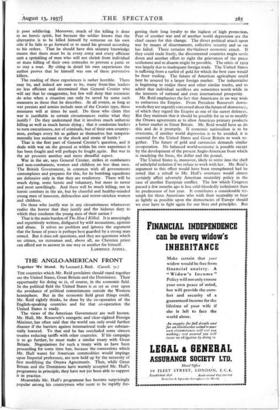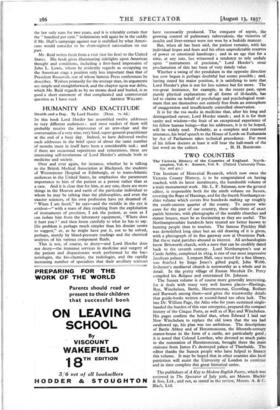THE ANGLO-AMERICAN FRONT
Together Stand. 'By Leonard Reid. (Cassell. 5s.)
THE countries which Mr. Reid prOclaimi should stand,tOgether are the United States, Great Britain and the Dominions. Their opportunity for doing so is, of course, in the economic field. In the political field the United States is as set as ever upon the avoidance of political commitments outside the Western hemisphere. But in the economic field great things could, Mr. Reid rightly thinks, be done by the co-operation of the English-speaking countries and for that cooperation the United States is ready.
The views of the American Government are well known. Mr. Hull, Mr. Roosevelt's energetic and "clear-sighted Foreign Minister, has often said that' the world can only avoid further disaster if the barriers against international trade are substan- tially lowered. To that end he has conclUded 'sonic sixteen treaties reducing tariffs with other countries: If his. campaign is to go further, he must make a similar treaty with Great Britain: Negotiations for such a 'treaty With us have "been proceeding for some time but, because the concessions which Mr. Hull wants for -American commodities Would impinge upon Imperial preference, are helcrup 'by the necessity of first modifying the Ottawa Agreeinetds. Thus", .while Great Britain and the- Dominions have warmly"accepted Mr. _Hull's programme in principle; they have not yet been able to support it in practice. - Meanwhile Mr. Hull's programme ,has beciame surprisingly popular among his countrymen whO seem to be "rapidly for,- getting their long loyalty to the highest of high protection. Fear of another war and of another world depression are the chief causes for this change. The direct political attack upon war by means of disarmament, collective security and so on has failed. There remains the 'indirect economic attack. If they could trade freely, the discontented countries might settle down and another effort to right the grievances of the peace settlement and to disarm might be possible. The crisis of 1929 was largely due to inadequate foreign trade. The United States is suffering from a surfeit of gold for which the best cure would be freer trading. The future of American agriculture could best be assured by a larger foreign market. The industrialist .is beginning to realise these and other similar truths, and to admit that individual sacrifices are sometimes worth while in the interests of national and even international prosperity.
Mr. Reid emphasises the fact that Americans in no way wish to embarrass the Empire. From President Roosevelt down- wards they are urgently concerned about the future of democracy, of which they regard the Empire as one of the surest defences. But they maintain that it should be possible for us so to modify the Ottawa agreements as to allow American primary products a better market in Great Britain. Mr. Reid would have us do this and do it promptly. If economic nationalism is to be overcome, if another world depression is to be avoided, it is essential for the United States and Great Britain to work to- gether. The future of gold and currencies demands similar co-operation. No balanced world-economy is possible except by the development of the present Anglo-American front which is steadying the franc, the dollar and the pound.
The United States is, moreover, likely to retire into the shell of unhelpful isolation if we refuse to work with her. Mr. Reid's argument to this effect would . have been strengthened had he noted that a rebuff to' Mr. Hull's overtures would almost certainly affect adversely American neutrality policy in the case Of another European conflict. The law which Congress passed a few months ago is less cold-bloodedly isolationist than its predecessor of last year. It constitutes a considerable tri- umph for those Americans who wish their neutrality to bear as lightly as possible upon the democracies of Europe should we ever have to fight again for our lives and principles. But the law only runs for two years, and it is tolerably certain that the " hundred per cent." isolationists will again be in the saddle if Mr. Hull's campaign against war is stultified by what Ameri- cans would consider to be short-sighted nationalism on our part.
Mr. Reid writes fresh from a visit (not his first) to the United States. His book gives illuminating sidelights upon American thought and conditions, including a first-hand impression of John L. Lewis, whom he evidently regards as occupying on the American stage a position only less important than that of President Roosevelt, one of whose famous Press conferences he describes. Written primarily for the average man, its arguments are simple and straightforward, and the chapter upon war debts, which Mr. Reid regards as by no means dead and buried, is as good a short statement of that complicated and controversial







































 Previous page
Previous page